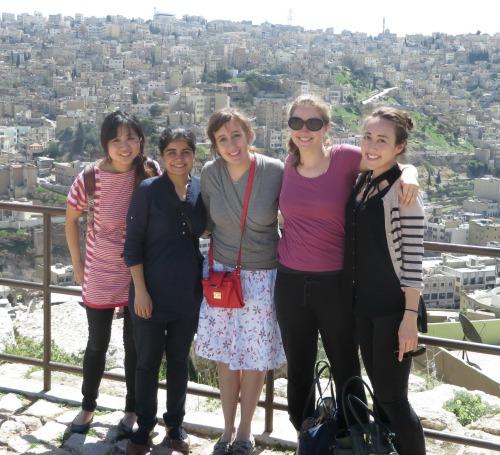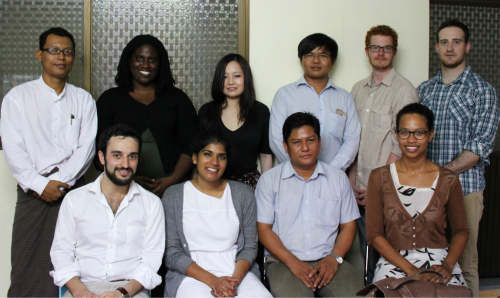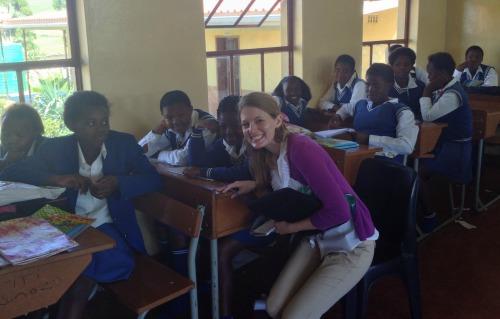Around the World in Seven Days
The Columbia Society of International Law Helped Organize Student Trips to Jordan, South Africa, and Myanmar as Part of Social Justice Initiatives' Pro Bono Caravans.
New York, April 16, 2014—As part of Social Justice Initiatives’ Spring Break Caravans, the Columbia Society of International Law (CSIL) helped organize trips to Jordan, South Africa, and Myanmar to provide opportunities for students to put their passion for human rights to work around the world.
In Jordan, students learned how to interview victims of torture before conducting client intake sessions under the supervision of attorneys from the Iraqi Refugee Assistance Project. A team of five students sent to the rural Transkei region of South Africa worked with lawyers from the Legal Resources Centre to document the conditions of local schools and make recommendations on potential litigation. And in Yangon, Myanmar, six students worked with attorneys from Justice for All, a civil society group committed to the advancement of human rights and the rule of law.
| Katherine Park '14, Naz Ahmed '14, Alisa Romney '16, Abigail Shaw '16 and Emily Fusco '16 enjoy the view of Amman, Jordan during a break from their work with the Iraqi Refugee Assistance Project |
“Partnering with local human rights groups around the world is the perfect way to combine students’ interests and experiences with local needs and opportunities,” said Douglas Cantwell ’15, CSIL’s co-president. “Caravans allow organizations to tackle projects that might otherwise tax their resources and give students the sort of once-in-a-lifetime experience that can provide long-lasting motivation for human rights work.”
The Myanmar caravan was inspired by Columbia Law School Professor Sarah H. Cleveland’s trip last year to provide assistance to that country’s parliament on constitutional issues at the request of Nobel Peace Prize Laureate and opposition leader Aung San Suu Kyi. The goal of the caravan was to learn the legal issues facing people in Myanmar and the strategies and challenges of human rights groups there, said Levon Golendukhin ’15, CSIL’s international programs chair, who organized the Myanmar caravan and was the group’s overall caravan coordinator.
“It was also a chance to engage in dialogue and share our understanding of U.S. and other comparative perspectives on the rule of law, constitutionalism, and human rights,” Golendukhin said.
The students who participated in the Myanmar caravan will help draft a training manual to inform citizens about their fundamental rights. The Myanmar work is supported by Cleveland and David L. Phillips, director of the Program on Peace-building and Rights at Columbia University’s Institute for the Study of Human Rights.
| The Myanmar student team with Justice For All staff at their Yangon office. From left to right: (top row) U Than Htaik, Stephanie Amoako ‘15, Amy Wang ‘15, U Khin Maung Win, Jan Messerschmidt ‘14, Douglas Cantwell ‘15; (bottom row) Levon Golendukhin ‘15, Ramya Ravishankar ‘14, U Kyaw Min San, Mariel Fernández ‘13 |
In South Africa, students documented the conditions of 17 schools in the rural Transkei community, drafting reports on some of the major issues they found, including significant overcrowding—up to 100 students in a classroom with a single teacher—and a lack of adequate toilets and clean drinking water.
Nathiya Nagendra ’14, a former intern at Legal Resources Centre who organized the South Africa caravan, said the work was “truly inspirational and rewarding” as it has the potential to bring about real changes to protect students’ constitutional right to a basic education.
| Caitlyn Carpenter '15, with students, while documenting conditions at a school in the rural Transkei community of South Africa |
The caravans help bring classroom concepts to life, Cantwell said.
“While the study of law can often be abstract, getting out into the field, exchanging ideas, and making an impact on the lives of others is not only deeply fulfilling but also really underscores the value of a strong human rights legal education,” he said.
Each year, Social Justice Initiatives works with students to coordinate the caravans, which are directed by student interests, and provides a small amount of financial assistance to students who qualify.
“The caravans allow students to provide legal services to clients and organizations about whom they feel passionate, and to see firsthand how pro bono work can make a real impact, “said Laren Spirer, Columbia Law School’s Director of Pro Bono Programs.
In total this year, 18 SJI Spring Break caravans sponsored by a variety of student groups—the Columbia Black Law Students Association, Criminal Justice Action Network, Society for Chinese Law, Native American Law Students Association, Midwest Society, the Workers’ Rights Student Coalition, and Environmental Law Society—spread out to offer pro bono assistance domestically and abroad.
Alisa D. Romney ’16, who led the Jordan caravan for CSIL and co-sponsor the Society for Immigrant and Refugee Rights, said the most meaningful part of her trip was interviewing an Iraqi family and learning “the most intimate and heartbreaking moments of their lives.”
“I think for all of us the trip reaffirmed the importance of paying the benefits of a Columbia Law School education forward and helping those most in need in the best ways we can,” she said.


